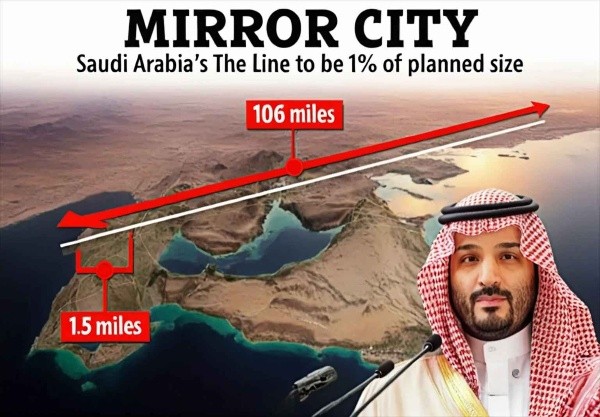Iran’s Plan to Strike Back Against the U.S.
Iran’s Military Preparations Following U.S. Attacks
Loading...

As the clock ticks closer to the end of the decade, it seems that Saudi Arabia might not become the Middle East's futuristic powerhouse anytime soon
Introduction
Saudi Arabia's NEOM project, a centerpiece of Crown Prince Mohammed bin Salman's Vision 2030, was launched with the promise of transforming the Kingdom into a global hub of innovation and reducing its dependency on oil. However, this ambitious venture has been plagued by financial missteps, ethical controversies, and alarming reports of missing workers, casting doubt on its future.
Financial Overreach and Scaling Back
NEOM, envisioned as a futuristic megacity, was initially set to feature groundbreaking innovations like the world's tallest skyscrapers and a 106-mile mirrored city known as "The Line." However, the project's financial demands have proven overwhelming. Originally budgeted at £500 billion, realistic estimates now suggest costs could soar to £2 trillion. This financial strain has deterred foreign investors, crucial for the project's success, and led to a significant scaling back of its scope. The initial plan to accommodate 1.5 million residents by 2030 has been reduced to just 300,000, reflecting the Kingdom's struggle to attract investment amid fluctuating oil prices.
Human Rights Violations and Forced Evictions
The development of NEOM has been marred by severe human rights violations. The Huwaitat tribe, indigenous to the area designated for the project, has faced forced evictions, with at least 20,000 members displaced. The tragic death of tribal leader Abdul Rahim al-Howeiti, who opposed these removals, underscores the brutal measures employed to advance NEOM. Similar tactics have been reported in Jeddah, where residents were evicted to make way for development, raising serious ethical concerns about the project's impact on local communities.
Labor Exploitation and Missing Workers
Reports of labor exploitation have further tainted NEOM's image. Allegations have surfaced that up to 100,000 migrant workers, essential to the project's construction, have gone missing or remain unaccounted for. These workers, often from South Asia and Africa, are employed under the Kafala system, which has been criticized for creating conditions akin to modern-day slavery. The lack of transparency and accountability regarding their treatment has drawn international condemnation and raised questions about the Kingdom's commitment to labor rights.
Cultural and Technological Challenges
NEOM's vision of a liberalized society, featuring mixed-gender activities and advanced technology, clashes with Saudi Arabia's conservative norms, potentially leading to cultural tensions. The project's reliance on unproven technologies, including extensive AI and surveillance systems, poses ethical dilemmas concerning privacy and civil liberties. Critics warn that NEOM's technological ambitions could lead to unprecedented control over residents' lives, further complicating its implementation.
Conclusion
The future of NEOM remains uncertain as it grapples with financial challenges, human rights issues, and ethical concerns. While the project was intended to symbolize Saudi Arabia's aspirations under Vision 2030, its current trajectory suggests a need for reevaluation. Experts argue that focusing on sustainable development within existing cities might be a more pragmatic approach. NEOM stands as a cautionary tale of the complexities involved in balancing visionary ambitions with practical and ethical considerations in modern development.
Editor
Iran’s Military Preparations Following U.S. Attacks
Troops remain in five strategic locations, raising fears of renewed tensions and long-term occupation.
Opposition forces have taken control of the capital after a significant offensive. Here is how it unravelled.
